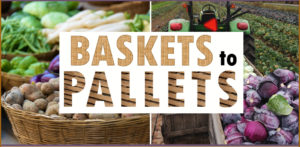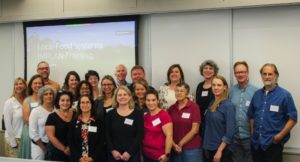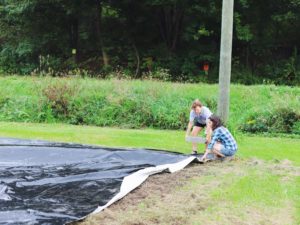Cornell Small Farms Program Year in Review
Letter from the Director
It has been quite a year for the Cornell Small Farm Program. We have grown to ten amazing, committed staff who actively work to support the viability of small farms through education, outreach and research. Each works closely with many partners, especially Cornell Cooperative Extension Educators, toward our mission of helping farmers get expert assistance to facilitate all phases of small farm business development, from initial growth to optimization to maturity.
This work will continue into the new year as we consider what are the emerging needs of small-scale farmers. Stay tuned for the next NY Small Farm Summit in 2019 where we invite you to help set the direction of our future efforts.
Thank you for your support and best wishes for a joyful new year.
Anu Rangarajan
Baskets to Pallets

As winter gave way to spring, we launched a new professional development Cohort consisting of 15 educators and farmers. Over the next two years, members of the Baskets to Pallets Educator Cohort will come together to pool knowledge and skills, network with buyers, design and teach new curriculum, and provide one-on-one support to farmers. You’ll see many of the Cohort educators debuting new activities at one of our upcoming 2019 trainings.
Beginning Farmer Learning Network
As of 2018, this network of farm service providers throughout the Northeast has been meeting for 10 years, providing an open venue for educators, technical service providers, loan officers and others to discuss the challenges with helping farmers in their first 10 years. Our next meeting is Feb 9, 2019 in Lancaster, PA as part of the annual PASA conference.
Farm OPS: Veteran in Agriculture

Our partners at Jefferson County CCE maintained a regular presence on Fort Drum for career days to educate transitioning soldiers about agricultural careers, and the hosted several farm tours that introduced active duty soldiers and area veterans about farming and farm life. Over a dozen individual trainings occurred from the Hudson Valley, to Watertown, to the Southern Tier. We also held a hands-on high tunnel raising that helped a beginning farmer veteran construct their first sheltered growing space for their farm. We’ve provided scholarships to agricultural entrepreneurs to cover general farm business trainings, or specific farm enterprise workshops.
Labor Ready Farmer
The Labor Ready Farmer project team, with partners located across the state, has met regularly to discuss progress, challenges, and next steps. It became clear that labor readiness — being prepared to hire, manage and retain skilled employees — is crucial for new farmers to mature their skills, scale up and thrive in business. Work to address the needs of the project’s two new farmer groups (advanced beginning farmers operating between 3-10 years, and hispanic farm managers and employees) is now well underway. In addition to numerous articles and project announcements, a broad education campaign highlighting the importance of managerial skills across New York State was launched as the Good to Great’s project, a 20 minute manager webinar series. Additionally, a series of four Labor Ready Farmer videos were released, sharing the stories and advice from four Hispanic individuals who have climbed the ladder from laborer to management to farm ownership in New York State.
As 2019 approaches, LRF curriculum development is in full swing. Driven by evaluation and survey data, one project goal is the creation of professional development and management trainings specific to the NYS agricultural industry. Thanks to strong collaboration between LRF staff and project partners, a pilot program combining professional development with advanced English language learning was launched in late Fall. Similarly, a complete professional development and agriculture workforce training lineup aimed at all of New York State’s agricultural managers and employees, including multi-day workshops, can be expected throughout 2019.
Livestock Research
We released the NYS Livestock Report in November 2018, which is a summary and analysis of the feedback gathered from over 600 livestock producers and other industry professionals at the 2017 NYS Livestock Summit. We have also been working on updating the Direct Marketing Guide to Livestock and Poultry, which was last updated in 2011. We are nearly done and expect to release the new version in early 2019.
Local & Regional Food Systems

Ongoing and each month we take some time to get to know our LRFS network better, to help catalyze collaboration and strengthen our impact. Since April 2017, we have interviewed more than 50 of the many dedicated people who work in local and regional food systems. You can explore the growing network on our website.
Online Courses
Our 20 online courses in 2018 have reached more than 600 students and ranged in topic from mushroom production to business planning, and grazing management to using high tunnels. We also launched a new course in November 2018, Getting Started with Pastured Pigs (BF 138), taught by Jason Detzel from Cornell Cooperative Extension of Ulster County. Across the whole spectrum of topics, there is one common denominator in all of our courses: supporting farmers in improving their profitability and quality of life, so that they can sustain their farms into the future.
Reduced Tillage

This year we talked tarps, mulching, cover crops and zone tillage with over 300 farmers and educators at workshops and field day demonstrations across the state and the Northeast. We finished three years of cover crop research in zone tillage to better understand the biology and management tools, and started sharing lessons from the field. Tarps are covering more and more beds, and now we’re learning more about the science. We’ve worked with growers and continued doing systems-based research to share reduced tillage tarping practices that combine tarps with permanent beds, organic mulch, and cover crops. In the year ahead, we’ll continue to dig deep into how these practices can impact weeds, labor, yields and soils and help to identify the best strategies to be successful with less tillage.
Speciality Mushrooms
Our specialty mushroom project continues to encourage small farms to consider this high value niche crop. In 2018, we continued offering workshops around the state highlighting the viability of outdoor log-grown shiitake mushrooms for farms with underutilized woodlands. Eight workshops were attended by 269 existing and prospective famers, with 24 serious growers continuing on to participate in one-on-one support as they developed a plan for their business. Workshop content focused on post-harvest considerations and marketing has been converted into a series of short lessons, available online.
We are also releasing a new guidebook in early 2019, titled “From Harvest to Market: Developing a viable Specialty Mushroom Enterprise” and a new series of videos about indoor cultivation methods for oyster and other mushroom species. Our program is further diversifying our offerings, moving into growing considerations for urban agriculture. We hosted two workshops in New York City in 2018 and are planning more activities for the coming year.

